2020 Annual Report
Published June 2021, the ASP's 2020 Annual Report introduced our first digital and dynamic version, sharing with you the incredible work and accomplishments of the Society during the COVID-19 pandemic.
Note: Financial Reports for 2020 were added to this report in July, 2023.
Donate Today to support reaching a broader audience of educators and learners around the world with innovations in digital teaching and learning of astronomy.

